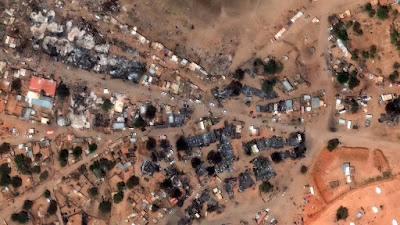Friday, 11 April 2025 - full copy:
Sudan: World's largest humanitarian crisis in terms of displacement
Press Conference by Shaun Hughes, World Food Programme (WFP) Regional Emergency Coordinator for the Sudan Crisis, on the situation in Sudan.
Senior World Food Programme (WFP) official in Sudan Shaun Hughes said, “By any metric, this is the world's largest humanitarian crisis in terms of displacement,” adding that “four out of every five people displaced are women and children.”
Hughes briefed reporters remotely from Nairobi today (10 Apr) on the situation in Sudan.
He said, “12.7 million people have been forcibly displaced from their homes. Over eight million people displaced internally, and four million across borders arriving to countries that are already facing high levels of hunger and humanitarian needs.”
In terms of hunger, the WFP official said, “this is the only place in the world where famine is currently confirmed, and only the third famine to be classified this century.”
Hughes continued, “The scale of what is unfolding in Sudan threatens to dwarf much of what we've seen over previous decades. In the Zamzam camp alone, which has been under siege for several months. There are over 400,000 people.”
The Regional Emergency Coordinator added, “Across the country, nearly 25 million people, or half the population, face extreme hunger. Nearly five million children and mothers are acutely malnourished.”
“This is a man-made crisis, man-made because it is driven by conflict, not by drought or floods or earthquakes, and man-made because of the obstruction of access to humanitarian assistance by parties to the conflict,” the WFP official stressed.
Hughes highlighted that WFP’s goal is to scale up to reach seven million people by mid-year, “focusing primarily on those 27 areas that are classified as in famine or risk of famine.”
He continued, “we need to be able to quickly move humanitarian assistance to where it is needed, including through frontlines, across borders, within contested areas, and without lengthy bureaucratic processes.”
“We need to re-establish offices and staff presence across all areas of the country, including the Darfur and Kordofan states, so that we can be close to the people we serve and monitor assistance and the situation as it unfolds. We need to be able to obtain visas for staff and custom clearances for goods and equipment,” the WFP official added.
He stressed that humanitarian agencies alone don't have the influence to negotiate this, “it requires the world to pay attention and coherent and tenacious engagement from the international community, particularly countries that have influence on those waging war.”
The Regional Emergency Coordinator for Sudan Crisis, World Food Programme (WFP):
For the next six months in Sudan, in order to reach the objective of assisting seven million people, WFP has an 80 percent funding gap amounting to $650 million and another $150 million shortfall to take care of people that are fleeing across borders into Chad, into South Sudan, into the Central African Republic and elsewhere.
“Without funding, we're faced with the choice to either cut the number of people receiving assistance, or to cut the amount of assistance that people receive,” Hughes said.
He explained that the cut is already happening. “This month, we've reduced rations in famine areas to 70 percent of what people need, and in areas that are at risk of famine to 50 percent. The funding we need is not only for food assistance, but also for the joint services that we provide to the broader humanitarian response, including humanitarian air services and logistics services,” Hughes said.
Asked about the funding gap, the WFP official said, “none can be attributed to the broader cuts in US foreign assistance. Fortunately, all allocations that the US government has made to Sudan remain effective, for which we are grateful.”
“I think more broadly that the outlook globally for funding of humanitarian assistance is quite disastrous due to a number of changes in the approach by donors,” he concluded.
Transcript
Follow along using the transcript at video: https://youtu.be/UwQIXSImTGs
End




